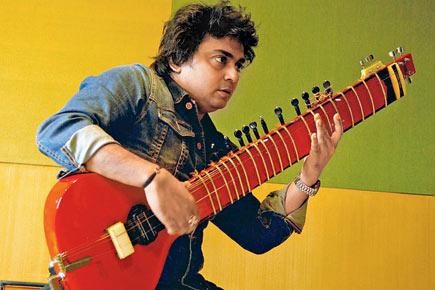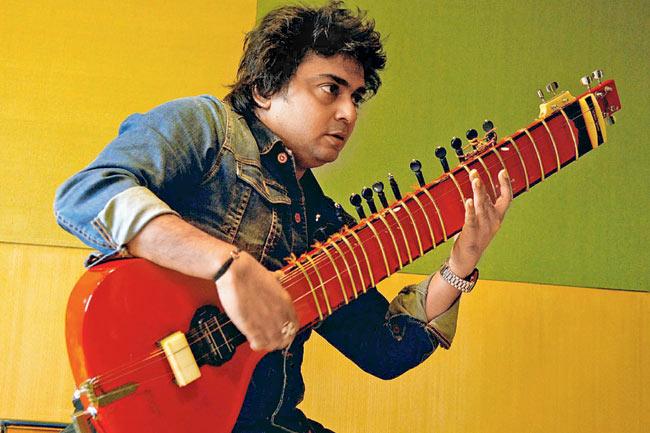In a freewheeling chat with the talented and energetic artiste Niladri Kumar talks shop, the raw deal that most musicians get in India and, of course, the zitar

Niladri
When we were waiting at the reception of the Bandra studio where Niladri Kumar was recording at, questions were whirring in our head, as we had to make sure that we didn't miss out on anything. "Niladri will take 10 minutes more as he is finishing a recording," we were told, giving us more time to prepare. Finally, with our presumptions of a serious, kurta-clad, no-nonsense musician intact, we entered the wooden-floored studio with bright orange and green walls, only to emerge over an hour later, with an entirely different mindset.

ADVERTISEMENT
On entering, Kumar swamped us with apologies, and instead of the stereotypical kurta-pyjama, he sported a chic, well-fitted pair of black pants, a T-shirt and a blue denim jacket. The artiste welcomed us with warmth and soon, our inhibitions, and presumptions vanished as we got down to speaking about his upcoming album, Sur Yajna. The musician settled himself on a bright red stool, complaining (rather amusingly) about its rickety base.
Classical for all
"I recorded this album in the south of France, and then got it mixed in India by the great sound mixer Eric Pillai, because I wanted the best sound possible," reveals Kumar, stressing that it is not just for the connoisseurs of Classical music, but even for those who might not understand it too well, but connect to Classical music at some level.
Kumar also plans to release a DVD with the album that will try and create the euphoria of a concert. "For the younger audience, music has become more of a visual medium than an audio one. They like to see the artiste than just hearing him," he puts things into perspective.
The zitar revolution
With the conversation flowing, we quizzed him about his invention — the zitar — that added another dimension, not just to his personality and his music, but also his popularity. Being his effervescent self, the musician revealed that he followed the famous adage — necessity is the mother of invention — to create the instrument.
Kumar was born in Kolkata, and was just a month old when his family shifted to Mumbai. While the environment at home was "all-things-Classical", his world outside the house was not even close to that. "Even at college fests, when I used to play Classical music, people's focus was more on other Rock-Pop performances. So, the seed was sown there," he shares.
After college, Kumar began playing the sitar for Indian films. "It isn't easy; it's specialised work. It took me a few years to get the hang of it," says the musician, adding that that journey left him exposed to non-Classical instruments and newer sounds. In the late 1990s, Kumar started playing alongside instruments alien to the Classical set-ups like the drums, piano, bass player, etc. "I began playing fusion with them. I was playing with DJs and drummers; I didn't even have proper amplifications. So, the DJs drowned my sound out. Because my sound was not reaching the audience and all the other factors put together, I made the zitar, which was a mix of a sitar and a guitar," informs the musician.
No fair play
However, despite great achievements and unparallel talent, musicians like Kumar are often subjected to exploitation in India. "Music companies exploit musicians. There is no return for the artiste's own works in our country. We are culturally so rich, but we don't care for musicians and that's why several people who were top musicians at one time are now finding it tough to even make ends meet in their old age," rues the musician.
But he maintains that his generation of musicians is aware of this and try not to get bullied into doing things. "For example, I don't like to do a lot of work with music labels anymore because it's better to be independent. There was a time when music labels would create the artiste, nurture him and propagate his works, utilise it to generate money to give it to him. That was the role. But now they aren't doing any of it. They are just waiting to get a product from the musician which they can exploit and pocket the returns," he opens up.
On that note, we ended the conversation with a musical piece by Kumar, hoping for better situations for artistes in the future.
 Subscribe today by clicking the link and stay updated with the latest news!" Click here!
Subscribe today by clicking the link and stay updated with the latest news!" Click here!







